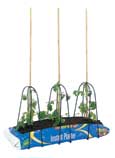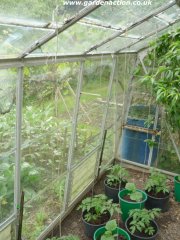Categories
Calendars
Guides
Reviews
Archive
Gallery
Articles
Ask Our Gardening Expert
HOW TO GROW GREENHOUSE TOMATOES - NAVIGATION
When you have pricked out your greenhouse tomato plants it's time to
think about how they will be grown in their final positions. Key to
this, whatever cultural method is used, it know what type of tomato
plant you are growing.
The two main types of tomato plants are
determinate and indeterminate. These are the official names, but a
couple of alternate names are also used. Determinate tomato varieties
are also know as bush tomatoes. Indeterminate tomato varieties are also
known as cordon or vine tomatoes. It's important to look at the seed
packet to determine which type you have.
Bush /determinate tomatoes are the easiest type
to train and support.
In theory they require no support or training but that's not always been
our experience. Whatever growing method is
used, it's best to insert something like a bamboo cane into the soil or
compost below. When the tomato plant reaches 30cm / 1ft high, use
lightly tied string to secure the main stem of the bamboo cane. Do this,
a foot higher each time, as the plant grows. Cordon / vine / indeterminate tomato plants definitely do need support
and training. Ingenious gardeners and horticultural companies have come
up with many, many different systems for supporting tomato plants. But
the basics remain, the plant needs to be tied to some form of support as
it grows.
On the left is a picture of a standard tomato plant support.
It's available from Harrod Horticultural by clicking here. It's not only good for supporting tomatoes in grow bags
but also soil grown and ring culture grown. Over the years,
greenhouse gardeners have devised many ingenious methods of
supporting tomatoes. Some involve erecting bamboo canes tied
together laterally to provide support, others are alternate,
more costly but more permanent solutions from horticultural
companies. See "supporting tomato plants for free" below for the
method we recommend.
A word or two about training tomato plants may prove
educational. Not only can tomato plants be trained vertically
but they can also be trained at an angel of about 45°. This is
useful where height is restricted. They can also be trained into
a V shape. One stem being trained 60° to the left, another 60° to
the right.
Tomatoes can be trained in almost any shape or
direction you can imagine. The current trend for growing them
upside down in baskets is evidence of that.
To support tomato plants for free in
a greenhouse, simply tie one piece of string to the
struts at the top of the greenhouse for each tomato
plant. Secure the string to the ground using a peg or
similar. If using bottomless pots the string can be
secured below the base of the pot.
As the tomato plant grows, simply
wind the string around the stem at 3ocm / 1ft intervals.
It really is that simple. Just make sure when you secure
the string to the ground that there is some slack in it.
This will then give sufficient slack for winding the
string around the stems. Click the picture on the right
to see an enlarged version. Tomatoes should be transplanted from their
initial pots to their final positions when the temperature
conditions in the greenhouse are warm enough. Look to get the
tomato plants to a height of of about 30 to 35cm / 12 to 14in
high when they are transplanted.
Dig out a hole just a little wider and 5 to 8cm
/ 2 to 3in deeper than than the root ball. Tip the pot upside
down with two fingers either side of the stem and touching the
soil surface. Tap the entire plant and root ball out into your
hand, then insert the root ball into the pre-dug hole.
Tomato plants should be transplanted so that the
root ball is 5 to 8cm / 2 to 3in deeper in the soil than it was
in the original pot. This will encourage the stem to sprout new
feeding roots from the newly covered stem.
Fill
in with compost and gently firm down. Water the plants in well.
GO TO NEXT PAGE ON WATERING GREENHOUSE TOMATOES
SUPPORT AND TRAIN BUSH GREENHOUSE TOMATOES
SUPPORT AND TRAIN CORDON / VINE GREENHOUSE TOMATOES

SUPPORTING TOMATO PLANTS FOR FREE
TRANSPLANTING TOMATOES FROM POT TO FINAL POSITION
or
GO TO GREENHOUSE
TOMATOES INDEX PAGE

